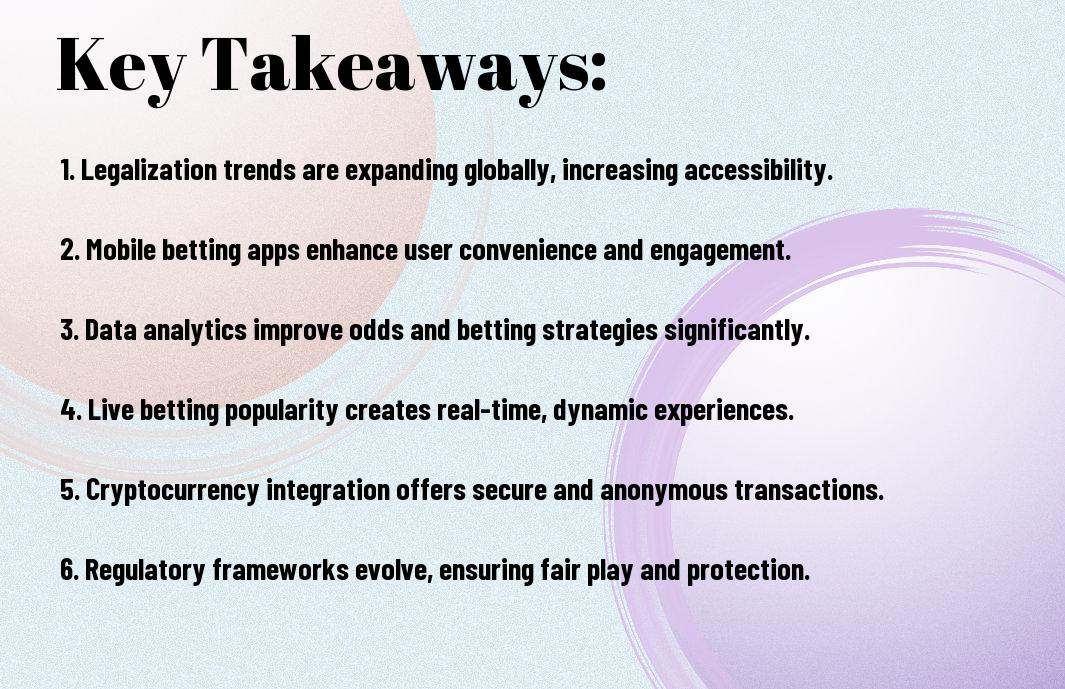As you explore the world of sports betting, you’ll notice significant changes taking place. Your understanding of the industry is about to expand, as new technologies and innovations emerge. You’re likely aware that sports betting has come a long way, and now you can experience it like never before. With shifting regulations and advancing technologies, your betting experience is becoming more personalized and accessible, setting the stage for an exciting future in sports betting.
Key Takeaways:
- The rise of online sports betting has led to increased accessibility and convenience for users, with many platforms now offering mobile apps and in-play betting options, changing the way people engage with sports.
- Technological advancements, such as artificial intelligence and data analytics, are being used to enhance the sports betting experience, providing users with more accurate predictions and personalized recommendations.
- Regulatory changes and the repeal of the Professional and Amateur Sports Protection Act (PASPA) in the US have opened up new markets and opportunities for sports betting operators, leading to significant growth and investment in the industry.
- The integration of sports betting with social media and esports is becoming increasingly popular, with many platforms incorporating social features and live streaming to create a more immersive experience for users.
- The use of blockchain technology and cryptocurrencies is expected to play a significant role in the future of sports betting, offering increased security, transparency, and efficiency in transactions and data management.


Traditional Sports Betting Landscape
The traditional sports betting landscape has undergone significant changes over the years, and as you explore this topic, you can learn more about it from resources like The Evolution of Sports Betting: How Technology is Changing the Game, which provides valuable insights into the industry’s transformation.
Brick-and-Mortar Establishments
With the rise of sports betting, you’ve likely encountered traditional brick-and-mortar establishments where people gather to place bets and watch games, creating a social atmosphere that enhances your overall experience.
Early Online Platforms
Between the emergence of the internet and the development of modern sports betting platforms, you’ve seen the introduction of early online betting sites that allowed users to place wagers remotely, marking a significant shift in how people engage with sports betting.
Consequently, as you examine deeper into the history of early online platforms, you’ll discover that they paved the way for the modern sports betting industry, offering greater convenience and accessibility, which in turn, has contributed to the growth and popularity of sports betting, allowing you to explore various options and find the one that suits your needs.
Digital Transformation
Clearly, the shift to online platforms has revolutionized the sports betting industry, offering you greater convenience and accessibility. You can now place bets from anywhere, at any time, using your preferred device.
Mobile Betting Applications
On the go, you can use mobile betting applications to access a wide range of sports and markets, making it easier to manage your bets and stay up-to-date with the latest odds and scores.
Real-Time Wagering Systems
Applications like live betting platforms enable you to place bets in real-time, allowing you to react to changing circumstances and make informed decisions based on the current state of the game.
For instance, with real-time wagering systems, you can bet on specific events or outcomes as they unfold, such as the next goal scorer or the outcome of a specific play, giving you more control over your betting experience and allowing you to capitalize on emerging opportunities.
Technology Integration
Unlike traditional methods, technology has revolutionized the sports betting industry, enabling you to access a wide range of betting options and tools. You can now place bets online, use mobile apps, and analyze data to make informed decisions.
Artificial Intelligence in Odds Making
Against the backdrop of manual odds making, artificial intelligence has emerged as a game-changer, allowing you to benefit from data-driven predictions and more accurate odds. You can now rely on AI-powered systems to analyze vast amounts of data and provide you with valuable insights.
Blockchain and Cryptocurrency Betting
Across the globe, you are witnessing a significant shift towards blockchain and cryptocurrency betting, offering you enhanced security, transparency, and convenience. You can now use cryptocurrencies like Bitcoin to place bets and enjoy faster transactions.
Making the most of blockchain technology, you can ensure that your bets are secure and transparent, with all transactions recorded on a public ledger. You can also enjoy the benefits of smart contracts, which automate the betting process and eliminate the need for intermediaries, giving you more control over your betting experience.
Market Demographics
Many factors contribute to the evolution of sports betting, and understanding your target audience is key. You need to consider the demographics of your market to tailor your approach and stay competitive.
Millennial and Gen Z Impact
Prior to the current trends, you may have focused on traditional demographics, but now you must consider the influence of millennials and Gen Z on the sports betting landscape, as they bring new preferences and habits to the table.
Global Accessibility
Alike other industries, sports betting has become more accessible globally, allowing you to reach a broader audience and expand your customer base, as technology and regulations continue to shape the market.
Further, as you explore global accessibility, you’ll find that advancements in technology, such as mobile betting and online platforms, have made it easier for you to access sports betting markets worldwide, breaking down geographical barriers and opening up new opportunities for growth and engagement.
Regulatory Evolution
Now, as you explore the evolution of sports betting, you’ll notice that regulatory changes have played a significant role in shaping the industry. You’ll see that governments and regulatory bodies have been working to create a more secure and transparent environment for bettors.
Legal Framework Changes
Foundationally, you need to understand that changes in the legal framework have paved the way for the growth of sports betting. You will find that many countries have introduced new laws and regulations to govern the industry, providing you with a safer and more reliable betting experience.
Compliance Technologies
Between the lines of regulation and technology, you’ll find that compliance technologies have become crucial for sports betting operators. You can see that these technologies help ensure that operators adhere to regulatory requirements, protecting you and your personal data.
Due to the increasing importance of compliance, you will likely see further development of technologies that facilitate regulatory adherence, enabling you to bet with confidence and security, knowing that your rights are protected and that the games are fair.
Social Elements
Once again, you’ll find that social elements are playing a significant role in shaping the future of sports betting, as you consider the various ways in which betting is becoming more interactive and communal.
Community-Based Betting
Around the concept of community-based betting, you’ll notice that platforms are emerging that allow you to engage with other bettors, share tips, and participate in discussions, making the experience more enjoyable and dynamic for you.
Social Media Integration
Meanwhile, media platforms are being leveraged to enhance your sports betting experience, with many operators incorporating social media features that enable you to share your bets, follow other bettors, and stay updated on the latest news and trends.
The integration of social media into sports betting is allowing you to access a wealth of information, from expert analysis to real-time updates, which can inform your betting decisions and make the experience more engaging, as you navigate the various platforms and tools available to you, taking your sports betting to the next level.
Future Projections
Your understanding of the evolving sports betting landscape is crucial to navigating the industry’s future. You can expect significant advancements in technology and innovative features that will reshape the betting experience.
Virtual Reality Integration
Across the sports betting sector, you will see the integration of virtual reality, enhancing the immersive experience for users and providing new engagement opportunities.
Predictive Analytics Growth
Growing reliance on data-driven insights will drive the adoption of predictive analytics in sports betting, enabling you to make more informed decisions.
Hence, as you research deeper into predictive analytics, you will discover its potential to analyze vast amounts of data, identify patterns, and forecast outcomes with greater accuracy, giving you a competitive edge in the sports betting market.
To wrap up
With these considerations, you now have a clearer understanding of the evolving sports betting landscape. As you look to the future, your knowledge of emerging trends will help you navigate the changing market. You can expect innovations in technology and shifting regulations to continue shaping your sports betting experience, offering you new opportunities and challenges in the years to come.
FAQ
Q: What are the key factors driving the evolution of sports betting, and how are they shaping the future of the industry?
A: The evolution of sports betting is being driven by several key factors, including advances in technology, changes in legislation and regulation, and shifting consumer behaviors. The rise of online and mobile betting platforms has made it easier for people to place bets, while the increasing popularity of alternative betting markets, such as esports and virtual sports, is providing new opportunities for growth. Additionally, the use of data analytics and artificial intelligence is helping to improve the betting experience, with personalized recommendations and real-time updates becoming more prevalent. As the industry continues to evolve, we can expect to see even more innovative technologies and trends emerge, such as the integration of blockchain and cryptocurrency, and the development of more sophisticated betting tools and platforms.
Q: How is the increasing popularity of online and mobile betting changing the sports betting landscape, and what opportunities and challenges does this present for operators and consumers?
A: The shift towards online and mobile betting is transforming the sports betting landscape, with more people than ever before able to place bets from the comfort of their own homes or on-the-go. This has created new opportunities for operators to reach a wider audience and provide a more convenient and accessible betting experience. However, it also presents challenges, such as the need for robust and secure payment processing systems, and the importance of ensuring that consumers are protected from problem gambling and other potential risks. For consumers, the rise of online and mobile betting has made it easier to compare odds and find the best value, but it also requires a higher level of vigilance and responsibility to avoid excessive spending and other negative consequences.
Q: What role is data analytics and artificial intelligence playing in the evolution of sports betting, and how are these technologies being used to improve the betting experience and drive business growth?
A: Data analytics and artificial intelligence are playing a significant role in the evolution of sports betting, with these technologies being used to analyze vast amounts of data and provide insights that can inform betting decisions. For example, machine learning algorithms can be used to analyze team and player performance, identify trends and patterns, and predict outcomes. This information can be used to provide personalized recommendations and real-time updates to consumers, helping them to make more informed betting decisions. Additionally, data analytics and AI can be used to help operators optimize their pricing and risk management strategies, and to identify new opportunities for growth and innovation. As the use of these technologies becomes more widespread, we can expect to see even more sophisticated and data-driven approaches to sports betting emerge, and for the industry to become increasingly focused on using data and analytics to drive business growth and improvement.



